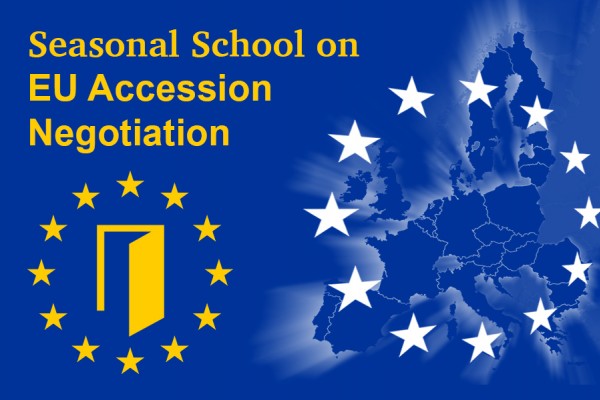
Seasonal School on EU Accession Negotiation
A unique opportunity for Western Balkans teams dealing with EU accession negotiations to connect, network, and discuss current and future challenges related to accession negotiations
26-30 October, Online
ReSPA has organized the five-day online School in cooperation with the European Institute of Public Administration (EIPA). It aimed to empower the civil servants in the WB public administrations with knowledge and professional skills but also to provide them with the opportunity to convene, talk to and learn from each other.
Around 100 participants from the Western Balkans countries have gathered in this regard, especially to share lesson learned from Montenegro and Serbia who already developed meaningful experiences in negotiations with colleagues from Albania, Bosnia and Hercegovina and North Macedonia.
The importance of this year’s School was more evident with the fact that it happened after the European Commission introduced its proposal for a new Enlargement Methodology, which will reinvigorate the accession process by making it more predictable, credible, and dynamic.
The Methodology will be applied to North Macedonia and Albania’s accession process and will be optional for Montenegro and Serbia. In July 2020, the European Commission presented the Council draft Negotiating Frameworks for Albania and North Macedonia, laying out the guidelines and principles for their accession talks. This year’s School also focused on the content of the negotiation process for the following Chapters of the acquis: 18, 22, 23, 24 and 27.
At its opening, Ms Ratka Sekulović, ReSPA Director, addressed the participants expressing her satisfaction by the fact that the School raised such a high interest in the Western Balkans region.
Mr Florian Houser, European Commission, DG NEAR shared his personal experience while he was working on opening Chapter 22 in Bulgaria and Croatia and also gave handy tips to participants on how to deal with the negotiation process focusing on real needs of citizens and businesses in the Western Balkans.
Mr Marko Mrdak, Deputy Chief Negotiator for the Chapter on the Acquis Communautaire, emphasized the importance of the strong collaboration between the Western Balkans during the negotiation process.
On the first day of the School, Juan Diego Ramírez-Cárdenas, ReSPA Expert (EIPA) gave a general overview of legal and political dimensions to the EU Accession Policy while Wolfgang Koeth, ReSPA Expert (EIPA) exposed practical aspects of Accession Negotiations focusing on actors, tools and instruments in the accession process.
On the second day, Gordana Đurović, ReSPA Expert presented models of institutional coordination of the European integration process in the Region focusing on the lesson learned and providing meaningfull recommandations for improving the coordination mechanisms within the Countries. While Bojan Vujović, Expert form Montenegro and Nevena Marčeta, Expert from Serbia presented the practical examples from Montenegro and Serbia on Chapter 22 related to the coordination of regional policies and structural instruments (EU funds and Programmes).
On the third day, Wolfgang Koeth, ReSPA Expert (EIPA) presented Accession negotiation through a step-by-step screening process and technical negotiations chapter by chapter. Svetlana Rajković, Expert form Montenegro and Miloš Samardžić, Expert from Serbia exposed the content of negotiation focusing on practical experiences from Montenegro and Serbia on Chapters 23 and 24, emphasizing that these chapters have a substantial importance during the negotiations.
On the fourth day, EIPA lecturer, Juan Diego Ramírez-Cárdenas, discussed in depth about the substantive aspects of the negotiations, explaining what can the EU and the candidate country negotiate and which are the common challenges during this process. Later, Mirjana Drenovak Ivanović, civil servant from Serbia and Ivana Vojinović, civil servant from Montenegro, described their concrete experience while engaged in the negotiations for Chapter 27 “Environment”, emphasising the complexity that this specific Chapter has.
On the fifth day, the former Deputy Prime Minister of Albania, Senida Mesi, thoroughly presented the preparations of the Albanian administration to negotiate with the EU, as well as made some remarks on the political vs technical dimension of the process. Later, Dragan Ignjatović, from Statistical Office of Serbia and Majda Savićević, from Statistical Office of Montenegro explained to their counterparts from the Region the specificities of the negotiation steps related to Chapter 18 “Statistics”.
The five days of the School have been characterized by lively discussions by participants on many issues such as the challenges imposed by the new methodology, the political and technical dimension of the negotiations, the Copenhagen criteria, the future of the process, etc. In this regard, after assessing the high interest of civil servants from the region, ReSPA will plan follow up activities focused in specific chapters of the acquis. ReSPA will award Certificates of Attendance to the successful participants of this Seasonal School.
“This year Seasonal School on EU accession negotiations served as a forum for improving the knowledge and capacities of civil servants across the Western Balkans on the process, as well as for transferring of experience from civil servants already engaged in the negotiations to those that expect to start the negotiations very soon. This shift of methodology from theory-oriented to practice-oriented, made the sessions of the Seasonal School vibrant and lively, with plenty of space for discussion, questions and remarks. In addition, the interventions of senior lecturers from the European Institute of Public Administration (EIPA), brought added values to the sessions of the School, presenting an innovative view-point on the technicalities of the negotiations among the EU and the candidate countries.
We believe that initiatives like the ReSPA’s Seasonal School contribute to improving the capacities of civil servants across the Region and, indirectly, contribute to the dynamics of reforms in the Region.” highlighted Gentian Xhaxhiu, Programme Manager Legal, ReSPA.



